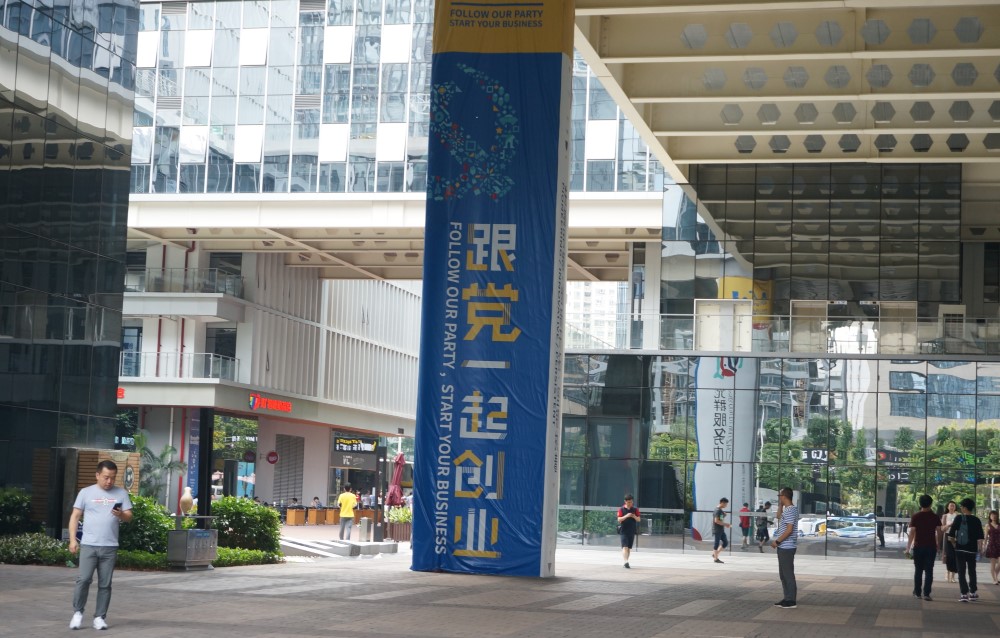Shenzhen’s tech workers face burnout striving for their entrepreneurial dream
19 June 2018At ten o’clock in the evening on most weeknights, row upon row of employees can be seen still hard at work, anchored to their desks and clearly illuminated inside the glass-fronted skyscrapers of Shenzhen’s Nanshan district, home to many of China’s major technology companies.

Kexing Science and Technology Park in Nanshan at night
Some staff do leave these buildings around 6.30 in the evening but most do not go home; they simply head to one of the many conveniently located restaurants or cafes for dinner or go to the gym for a quick workout before returning to their work station.
It is the same scene at weekends: Shenzhen’s integrated urban design and efficient transport network makes it very easy for staff to just drop by the office for a few hours on a Saturday afternoon. Those living further afield can of course work at home if they wish, and many choose to do just that. For the young tech workers of Shenzhen’s Silicon Valley, the boundaries between work and leisure time seem to be permanently blurred.
Overtime is not compulsory but workers accept that working long hours is the only way to get ahead in the tech industry. If you don’t work as hard as your colleagues you will soon get left behind or replaced by one of the thousands of other people clamouring for your job.
The online recruitment platform Zhaopin notes that java engineer is currently by far the most competitive job in Shenzhen with a staggering 14,409 applicants per day on 18 June, followed in second place by software tester (12,073 applicants a day) and, in fourth place, software engineer (9,483 applicants a day). While a survey conducted in 2017 showed that workers in China’s internet industry did more overtime than any other profession.
Employers know that by offering a relatively high starting salary with the promise of a substantial performance bonus they can get staff to work for as long and as fast as necessary in order to get the job done on time. As one industry observer based in Guangdong noted, a high salary means that “the boss basically owns you.”
A senior product manager at Tencent explained: “It is expected if you want to work in this industry and it’s worth it when you get a bonus at the end of the year.” A young artificial intelligence engineer at a start-up company, agreed: He earned around 20,000 yuan a month (three times the average wage) as well as share options from the company.
However, these rewards are not guaranteed, especially in the gaming industry where bonuses are entirely dependent on the success or failure of the game or app that workers are developing. Benefits vary from company to company, and even from team to team within a company, and are designed to keep staff compliant. Perform well and you will be rewarded. Under-perform and you will be replaced.
“There’s a huge number of candidates who can replace anyone in this field,” said a product manager who used to work in the gaming industry. As a result, he said, “no one will bother to take any action against their employer or file a complaint. You just don’t want to cause any trouble.”

Shenzhen’s Software Base, promoting Party-led start-up culture
There appears to be an almost complete lack of collective consciousness among the young tech workers of Nanshan. Instead, many have bought into the entrepreneurial myth (promoted by the Chinese Communist Party) that hard work brings its own rewards and that competition among workers rather than solidarity is the key to success. If there is an enterprise trade union in place in Nanshan’s tech companies, employees say, it keeps a very low profile. “They might exist but barely,” said one young worker with a smile.
Away from the bright lights of Nanshan however, it is a different story. The rapid growth of start-up companies in China’s technology sector has led to numerous business failures, with tens of thousands of workers being laid off without any compensation or being owed months of wages in arrears.
In many of these cases, tech company workers do take collective action. In April alone this year, CLB’s Strike Map recorded four separate wage arrears protests by employees at tech companies in Beijing, Tianjin, Shanghai and Nanjing.
As CLB noted in our January newsletter this year, some collective disputes in tech companies have even turned violent because of the harsh and uncompromising attitude of management. Workers at a call centre in Shijiazhuang, for example, came into conflict with management when their director suddenly announced that more than a hundred workers, about a third of the workforce, would be laid off with no pay, while many others would be forced to transfer internally.
When staff attempted to reason with their boss, he was heard shouting; “if you want to sue us, sue us, if you want to quit, then quit, but when you’re here, you obey the company!” As tensions increased, several managers pulled some of the most determined workers into a room and beat them. The incident was videoed by staff on their mobile phones and showed many workers with bloody injuries.
China’s tech industry is dominated by three massive conglomerates: Tencent, Alibaba and Baidu, which can all demand absolute loyalty and dedication from their staff. Underneath this gleaming umbrella however the industry is much more volatile and unpredictable and workers are vulnerable to exploitation and management abuses.
Since there is no sign that growth in the technology sector is slowing down, there is clearly a need for the official trade union to wake from its slumbers and start to organize workers and ensure that employees in China’s technology companies are properly protected and can earn a decent wage without having to devote their entire life to the company.
